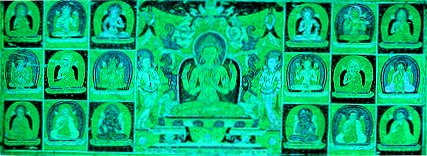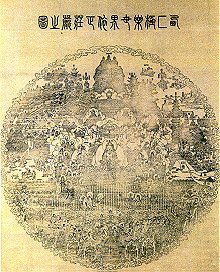
| Contents
93.2 Preparation of death 93.3 Supportive Recitation 93.4 Between death and burial 93.5 Funeral arrangement 93.6 Evidence of rebirth in Pure Land 93.1 Dying - Critical moment of rebirth No one can escape from death in this world. However, in Buddhism, death is merely the end of a period of retribution. When one leaves this body, one will be reborn into another body. The fate of rebirth is determined by two factors:
Preparation for death is actually preparation for rebirth. Those who practice Pure Land teachings with faith and vow, should prepare their personal provisions, so that when life reaches its end, they can be guided by Buddha to be reborn in Pure Land, providing they recite 'Amitabha Buddha' wholeheartedly at least ten times. It is necessary because by the time of dying, one may be disgusted, or terrified and panic, or attached to one's belongings, or missing one's relatives and friends. It is very difficult for one to avoid this unhappy state and to maintain right thought or recite the Buddha's name single-mindedly at such times. All kinds of evil Karma in one's past lives may come in effect by the time of dying, which may weaken one's body and perturb one's mind. Consequently, one cannot be reborn in Pure Land at the critical moment of dying. When the final moment comes, it will be too late for regrets, so the preparation for death is really necessary, particularly in Pure Land Buddhism.
The following action plan is recommended:
Prepare well and practice more. If one is not capable of controlling oneself at present, one will have no control during the final moments of his/her life either.
Family members, relatives and friends of a dying person should control their emotion and stay calm, without arousing any deep feeling of love-attachment or irritating him to have greater physical pain or forcing him/her to do anything. Weeping and crying should be avoided. Some people, while not crying, still show sorrow or sadness on their faces. This should be avoided too because it is a critical moment for the dying person at the crossroad, which separates the living from the dead, the mundane from the transcendental. With just one thought of anger at the time of dying, he/she may immediately sink into the cycle of birth and death, or even fall into the evil realms. His/her fate is determined by a hair's breadth! At this time, the most important thing is to practice supportive recitation [§UŠĀ], especially by family members or Buddhist friends. The following are some guidelines of supportive recitation:
When a person has just died, the most important thing is not to rush to move the person's body. Generally, one should wait about eight hours, or at least three hours to move and clean the person's body. Relatives and friends should not weep and cry before and after his death because it may cause the deceased to develop thoughts of attachment preventing him/her from achieving liberation and rebirth in Pure Land. They should keep on reciting Buddha's name in all earnestness until at least eight hours have passed. It is because although the patient has stopped breathing, his/her consciousness (Alaya consciousness) has not yet left his/her body during this period. He/she may experience feelings of pain, sadness, anger, which may lead him/her to the evil realms. The Pure Land practitioners should let their relatives and friends know it. Under all circumstances, the dying person should keep calm even though he is being disturbed or hurt.
Funeral arrangement should be kept simple. Unnecessary expenses should be minimized. Only vegetarian food should be served for the family members, relatives, friends and guests. Any more loss of living beings will further increase the Karmic obstruction and make it more difficult for the deceased to be liberated. Even if he has already been reborn in the Pure Land, his grade of rebirth may be lowered consequently. When performing follow-up good deeds on behalf of the deceased, one should dedicate the merits and virtues to all sentient beings in the Dharma realms. In this way, these merits and virtues will be multiplied many times over and so will the benefits accrued to the deceased.
93.6 Evidence of rebirth in Pure Land For the devotees to come to die, there are some 'signs' which are evidences for their rebirth in Pure Land, such as:
These are the signs of being born in the Pure Land, as seen in the past, and also at the present day. At the moment approaching death when he/she has already seen the Buddha, if he/she turns his mind again, hankering after his/her beloved ones, or wealth, fame etc., then he/she cannot be born in the Pure Land; even the Buddha cannot help him/her. It is said that quite often, when a devotee came to die, the vision of Buddha appeared before his/her eyes, but vanished at once when his/her mind was distracted by the voice of his/her spouse crying and calling upon his/her name. And in some cases the devotee was not only unable to be born in the Pure Land, but also fell into the evil realms on account of his/her anger. This is because his/her body was not yet thoroughly dead and therefore being moved by others was causing pain, which leads to hatred. Evil thoughts will subject one to evil re-birth especially at the end of one's life when they are exceptionally strong. The last moments of life are the most crucial ones. If the provisions for birth are not ready and adequate, the patient may not avoid extreme fright and bewilderment. At that time, it may be too late to seek help and regret. Facing with effects of all kinds of bad Karma accumulated over countless lifetimes, one has no confidence at all to achieve the rebirth in Pure Land even though one makes great effort in cultivation during the most recent lifetime. Therefore, while one may rely on others for support and assistance at the time of death, one should strive to cultivate during the life time prior to the death, to take heed and be prepared for the rebirth in Pure Land. |




